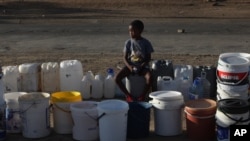The main street of this dusty South African town is lined with empty buckets, marking each residents' place in line as they wait for their daily water ration to be brought in by unreliable trucks.
Keeping watch over her buckets, Pulaleng Chakela sleeps in a wheelbarrow on the side of the road to save her spot in the line. The 30-year-old wraps herself in a little blanket as temperatures drop overnight, and asks a male friend to sit nearby for safety.
"If I don't wait here all night, the water will be finished," she said.
A flatbed truck carrying three 5,000-liter tanks arrived midmorning when temperatures had already reached 40° C (104° F). Murmurs of relief are soon replaced by angry shouts as residents learn they have been further rationed from filling four buckets to just two. In the chaos, Chakela slips two extra buckets in the line. The situation is so unfair that she feels no guilt, she said.
Disaster areas
Chakela is joined by dozens more residents of Senekal, a small town in South Africa's rural Free State province, one of four regions declared disaster areas as a drought dries up South Africa's heartland - along with much of eastern and southern Africa - bringing with it failed crops and acute water shortages.
The drought is a sign of a changing climate the whole region must prepare for, say experts. The El Nino weather phenomenon has returned to southern Africa, marked by delayed rainfall and unusually high temperatures, according to the World Food Program.
The environmental effects of El Nino are expected to last until at least 2017, affecting the food security of 29 million people due to poor harvests, said the WFP report.
The conditions in Senekal should serve as a warning to the rest of region to prepare themselves for the dry years ahead, said Tshepiso Ramakarane, manager of the Setsoto municipality, where Senekal is located.
"For the next 10 to 15 years, the situation is likely to get worse," he warned, adding that only days of sustained rainfall can solve the town's woes, despite the occasional scattered shower. "We are in the middle of a crisis."
Other towns in the district have even less water, but Senekal is in worse shape because of its poor infrastructure and distance from the nearest dam, pointing up the vulnerability of many places in the country to drought due to poor sanitation and running water systems.
Dealing with water shortage
The local municipality has now been forced to buy well water from surrounding farms at 1 cent a liter, distributing about 50 liters of water to each of Senekal's 8,000 households at no cost.
Those who can't wait up to ten hours in a line, however, have been forced to buy water directly from the farmers at premium prices.
Makhantsi Khantsi, a single mother of four who works as a security guard, said the farmers are charging her nearly seven times as much as they make the municipality pay and that's on top of the $10 she has to shell out for the 10 kilometer (6 mile) cab ride.
For laundry, the options are even more grim, and Khantsi and a dozen others use the stagnant, algae-ridden water collected in an abandoned sewage treatment tank to wash their clothes.
"When you are desperate, what must you do?" asks Refiloe Mangati, as she washes her children's school shirts by hand, scrubbing with too much detergent and rinsing quickly in the hope the algae - and the tadpoles - won't stain them.
On the farms surrounding the town, hot gusts of wind pick up dust on empty fields where there should be crops.
"We have not planted a single seed," said Borrie Erasmus, who grew up on the Biddulphsberg farm, about 20 kilometers (12 miles) outside Senekal. This is the first time in the five decades he has worked his family farm that he has missed the spring planting season.
Financial toll
If it rains for a few days before autumn, he may still plant sunflowers, but that won't offset the more than $60,000 Erasmus has already lost this season.
"One bad crop can put you back three or four years and now we have no crops," said Erasmus. Even if the weather returns to normal, it will still take at least five years for farmers to pay off the loans they've had to take out to survive.
South Africans, already facing a weak currency, will soon feel the effect of rising food prices as the country may have to import corn, Agricultural Minister Senzeni Zokwana warned on Monday.
Over the Free State, the few clouds gathering in the distance may bring some temporary relief, but farmers here say they need more certain intervention.
"We're hardy farmers, we're used to getting by without much, but these are such extraordinary circumstances that there is a need for government to help," said Erasmus.











